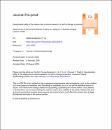Controversy and Debate: Questionable utility of the relative risk in clinical research: Paper 1: A call for change to practice

View/
Publisher version (Check access options)
Check access options
Date
2020-11-07Author
Suhail A., DoiFuruya-Kanamori, Luis
Xu, Chang
Lin, Lifeng
Chivese, Tawanda
Thalib, Lukman
...show more authors ...show less authors
Metadata
Show full item recordAbstract
Background and Objectives
In clinical trials, the relative risk or risk ratio (RR) is a mainstay of reporting of the effect magnitude for an intervention. The RR is the ratio of the probability of an outcome in an intervention group to its probability in a control group. Thus, the RR provides a measure of change in the likelihood of an event linked to a given intervention. This measure has been widely used because it is today considered a measure with “portability” across varying outcome prevalence, especially when the outcome is rare. It turns out, however, that there is a much more important problem with this ratio, and this paper aims to demonstrate this problem.
Methods
We used mathematical derivation to determine if the RR is a measure of effect magnitude alone (i.e., a larger absolute value always indicating a stronger effect) or not. We also used the same derivation to determine its relationship to the prevalence of an outcome. We confirm the derivation results with a follow-up analysis of 140,620 trials scraped from the Cochrane.
Results
We demonstrate that the RR varies for reasons other than the magnitude of the effect because it is a ratio of two posterior probabilities, both of which are dependent on baseline prevalence of an outcome. In addition, we demonstrate that the RR shifts toward its null value with increasing outcome prevalence. The shift toward the null happens regardless of the strength of the association between intervention and outcome. The odds ratio (OR), the other commonly used ratio, measures solely the effect magnitude and has no relationship to the prevalence of an outcome in a study nor does it overestimate the RR as is commonly thought.
Conclusions
The results demonstrate the need to (1) end the primary use of the RR in clinical trials and meta-analyses as its direct interpretation is not meaningful, (2) replace the RR by the OR, and (3) only use the postintervention risk recalculated from the OR for any expected level of baseline risk in absolute terms for purposes of interpretation such as the number needed to treat. These results will have far-reaching implications such as reducing misleading results from clinical trials and meta-analyses and ushering in a new era in the reporting of such trials or meta-analyses in practice.
Collections
- Medicine Research [1755 items ]


